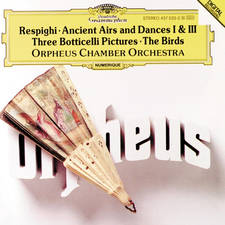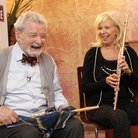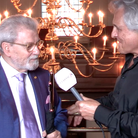Classic FM Meets Sir James Galway
Sir James Galway may forever be associated with those halcyon days of the 1970s, but, as he tells Classic FM, he's far from down and out.
Saturday night in the mid-70s meant three things for people of a certain age. It was the one night of the week one was allowed to have tea in front of the telly, watch the opening credits of Starsky and Hutch before bedtime, and James Galway was on at least one show every week: Val Doonican, The Two Ronnies, Parkinson. At least that’s how it seemed. Annie’s Song was everywhere, and most of one’s friends at primary school wanted to learn to play the flute, preferably a golden one.
Now, nearly 30 years later (ouch), it’s Classic FM’s chance to meet the world’s best-selling instrumentalist, the man whose chirpy face peered out at me from hundreds of magazine covers during those adolescent days and whose charm and blarney made him the king of the chat shows as well as the concert halls.
Sir James, or Jimmy as he introduces himself, doesn’t disappoint. As he played on the Oscar-winning soundtrack to the Lord of the Rings I’m sure he won’t mind Classic FM describing him as more Bilbo Baggins than Frodo. The twinkle is there, and an easy and occasionally surprising readiness to discuss the ups and downs of the last three decades and the pressures of being known as the greatest flute player in the world.
“Well, I am the greatest. None of the young guys who are coming through will do what I have done,” he says. “Even Emmanuel Pahud, who everyone always talks about now, won’t.’”
Crikey. No problems with confidence then.
To be fair though, he adds: “They can’t. You simply can’t be in an orchestra and have a successful solo career these days – there isn’t time. I tried it. I was with the Berlin Phil for six years – I joined when I was 29. I did solo work too but it was very, very taxing to do both – on your family, on your body, on relationships.
“I was working non-stop, always playing, always practising. I was lucky; I have always had a very strong constitution. But there’s still the schlep of getting your bones from place to place, and the demands are even higher these days.”
James himself takes it easier now. He may travel for over half the year, but it seems the drive of his youth has mellowed somewhat.
“Just the other day I turned down a gig in the States, even though they were offering a private jet to take me there! I just don’t want to work that hard. You want your kids to recognise you!”
Ah, the kids. James has four children from his first marriage. There are two sons, Stephen and Patrick, and twin daughters, Lotti and Jenny. Family life has clearly not been easy. The punishing schedule that meant we all got to see him regularly in our living rooms meant big sacrifices for his family.
“They still sometimes give me a hard time,” he says. “One of my boys always reminds me that I didn’t get to his school play.”
A common enough lament from the child of a busy dad, but perhaps more disturbingly, his other son hasn’t spoken to him for months.
“I’m not quite sure why,” he says. “His wife just returned some stuff to me. I think maybe they are splitting up and he doesn’t want to talk to me about it. They have a four-year-old son though, Samuel, who loves listening to me play. He’ll happily sit and watch a video of an entire flute concerto from start to finish. He’s a special lad, and my fear is that he will now go and live with his mother in Czechoslovakia and I won’t see much of him.”
Easier territory are the girls, who are both on the phone chatting with their dad during our interview.
“They play in punk bands. They tour Germany and play the same cities as me, but to audiences of about 20. I really don’t know how they do it!”
He acknowledges that all families are complicated, but is quick to tell me his personal life is incredibly happy. His wife Jeanne, an immensely likeable, cheery American, is another flute player. They met at a flute convention 22 years ago and have been together ever since. Sometimes she performs with him; they travel together constantly and during the morning I spend with them she seems to be the perfect helpmate, getting lunch sorted and the dry-cleaning done ahead of a recital James is giving that night in York.
“I think the secret of our marriage is that we’re very good at hanging out together. When I’m not working we quite happily play backgammon all day. Just the other day we were sitting in the garden of our house in Lucerne planning a trip to Capri, and we looked at each other and said, why would we leave here? We’ve two great cooks, the most fabulous views and there are no tourists!”
Life is sweet, and about to get busy again as James has an album to promote. Called Wings Of Song, it’s the first release from a new exclusive contract he’s signed with Deutsche Grammophon.
“There’s lots of good stuff on it. It reflects what I like; a really broad range of music. There’s a movement from Dvorˇák’s String Quartet which I love and which transcribes very well for the flute. And a couple of duets with an old friend of mine, cellist Moray Welsh. It was grand to work with him again.”
There’s also the premiere recording of the Lord Of The Rings Suite, which Howard Shore has written especially for James, and a brand-new anniversary recording of Annie’s Song. He even plays his famous penny whistle. Vintage Galway.
It marks a new beginning for James, as, with more than a trace of bitterness, he tells me how earlier this year he ended a long relationship with his management company.
“They were trying to keep me a secret,” he laughs, grimly. “They told me it would be almost impossible for me to get a gig in central London these days. Within a month of sacking them I’d sold out the Royal Festival Hall.”
James now runs his own affairs, employs several staff to arrange his diary and complicated performing schedule, and seems to be on a new roll. He also finds time for a considerable amount of charity work. He’s president of Flutewise, which gives flutes to kids and adults who otherwise wouldn’t be able to play.
“One class which impressed me particularly was where flutes had been adapted for kids with digital deformities. OK, they will never be James Galways, but they enjoy playing, and that gives them educational building-blocks.”
There’s also a considerable chunk of teaching. “I took a class the other day and 60 turned up and they were very, very talented. I was amazed. It’s like a disease; there are all these great flute players out there now! And they are so competitive, cut-throat even!”
Ah, Jimmy, Jimmy, you see what you started? Really, you’ve no one but yourself to blame!





